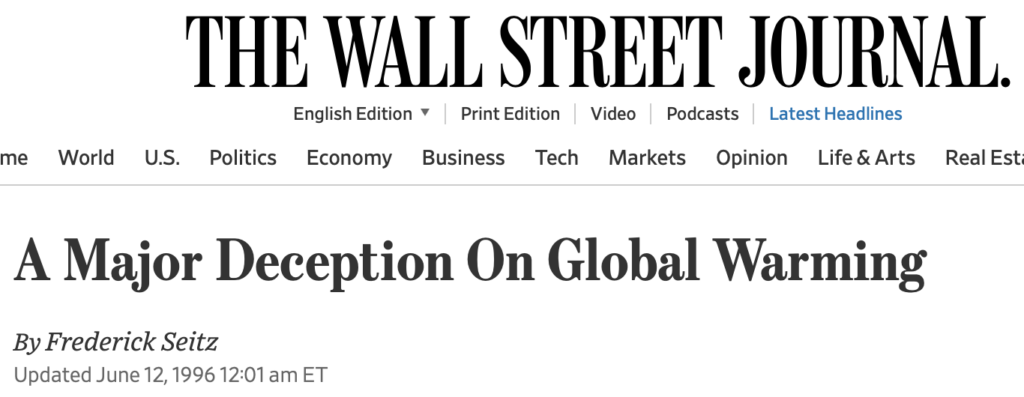
The BBC has launched a two hour series on the history of corporate climate denial. The series starts in 1988 and traces the rise in climate policy attacks through the George W. Bush Administration in the 2000s. They been researching this series for several months. Great to hear it finally!
Featured interviews include Naomi Oreskes, Ben Santer, Bob Ward, Susan Joy Hassol, Bob Brulle, Mike MacCracken and Bob Inglis.
The series was produced by Phoebe Keane, who appears in the final episode to talk about the hostility she received after sending a request for comment on the story to Willie Soon. The able correspondent is Peter Pomerantsev, author of books “Nothing Is True and Everything Is Possible: The Surreal Heart of the New Russia” (2014) and “This Is Not Propaganda: Adventures in the War Against Reality” (2019)
Listen to the whole 10 part series as podcasts on the BBC Radio 4 page.

Various documents from our ClimateFiles archive are featured in the series:
- 1994 Fred Singer proposal to the GCC
- 1988-89 Exxon internal briefings on global warming
- 1991 I.C.E Campaign
- 1998 American Petroleum Institute Global Climate Science Communications Action Plan
- Willie Soon Investigation
- 1995 GCC Draft “Primer”
- ExxonMobil lobbyist Randy Randol fax to Bush Administration
*****
1994 Fred Singer proposal to the GCC
Featured in BBC’s episode 5, “Big Oil’s Big Group.” This is a new document, just added to our GCC archives – a copy of a 1994 proposal by Fred Singer to the Global Climate Coalition – laying out a $73,000 multi-part “Public Education Program on Global Warming.”
Singer, who died recently, always claimed that he took little or no corporate funding. This document shows Singer soliciting tens of thousands of dollars from the corporate front group GCC, to go after the UN Intergovernmental Panel on Climate Change. We don’t have evidence that he got the money, but he and SEPP did some of the things he proposed here.
*****
1988-89 Exxon internal briefings on global warming
Featured in BBC’s episode 1 “Big Oil’s Big Crisis”, there are several documents from this period showing internal conversations about climate change within Exxon, specifically pondering the way the company had been approaching the issue to date and how things were changing after the hot summer of 1988, hearings in the Senate, the presidential election and accelerated urgency in the policy arena.
*****
1991 I.C.E Campaign
The 1991 “Information Council for the Environment” campaign by electric utilities and the coal industry is featured in the BBC’s episode 6 “Reposition Global Warming as a theory, not fact.”
*****
1998 American Petroleum Institute Global Climate Science Communications Action Plan
Featured in Episode 6 is a key document, the 1998 “Victory will be achieved when…” memo, a.k.a the American Petroleum Institute Global Climate Science Communications Action Plan. The Communications Team included Exxon, Chevron, Southern Company, Myron Ebell, Steve Milloy, CFACT, George C. Marshall Institute and others.
*****
GCC “Scientific Cleansing” attack on Dr. Ben Santer
This disquieting series of events is illuminated in BBC’s episode 5 “Big Oil’s Big Group”. In 1996, the Global Climate Coalition focused its attack on climate scientist Ben Santer, after the UN IPCC Second Assessment Report. Fred Seitz (or a ghost writer) penned an op-ed in the Wall Street Journal accusing Santer of “scientific cleansing”, a loaded phrase.

More of these tactics are documented in the 2013 Greenpeace Report “Dealing In Doubt”.
And here is the full collection of ClimateFiles documents we have on the GCC’s shameful campaign targeting Santer:
*****
Willie Soon Investigation
In BBC’s episode 9 “Deep pockets, useful allies”, the BBC uses Willie Soon to illustrate the deliberate corporate funding of scientists proffering work that casts doubt on prevailing scientific wisdom about the climate crisis. The BBC series discusses the story we broke in 2015 after a five year FOIA investigation, along with the paper Soon and colleagues published in 2007 on polar bears which concluding no threat to the bears from climate change. The study was funded by American Petroleum Institute, ExxonMobil Corporation and the Charles G. Koch Charitable Foundation.

Here are more of the documents we got from Smithsonian by Freedom of Information request:
*****
1995 GCC Draft “Primer”
Also featured in BBC’s episode 9, “Deep pockets, useful allies”, this document is key evidence that industry scientists knew to discount key climate denial arguments by 1995 and were apparently trying to guide corporate leaders out of these cul-de-sacs. The document was a critique of the IPCC 2nd Assessment Report and both acknowledges the reality of human induced climate change ad emphasizes the uncertainty of models and the inability of supercomputers to model the entire planet sufficiently. It sums up semi-credible talking points, just short of denial, that could be used by industry spokespeople, to downplay the IPCC report.
It also has a section that was not included in the final published “Primer”, a section with analysis of “Contrarian Arguments”, “alternate explanations” often used to “challenge the conventional view of greenhouse gas-induced climate change.”
…including the sun spots theory pushed by Williw Soon’s mentor Dr. Robert Jastrow:
Indeed, some 15-20 years later, this exact subject is seen in the titles of the grants Willie Soon received from American Petroleum Institute, ExxonMobil Foundation, the Charles Koch Foundation and the Southern Company.
For example, in a grant letter to Exxon:
and in a grant report to Southern company:
*****
ExxonMobil lobbyist Randy Randol fax to Bush Administration
This memo, featured in BBC’s episode 10 “Leaving the Tribe” and was obtained via a Freedom of Information request in 2001 (I believe by NRDC?). It contains very exacting instructions from one of ExxonMobil’s guys in Washington to the young Bush Administration on who to fire, who to hire and how the head of the IPCC might be removed with the United States help. And as featured on the BBC series, ExxonMobil specifically asks if scientist Mike MacCracken has been removed from “positions of influence.”
A second fax sent by Randol to the Bush Administration, contains a letter from Brian Flannery, who goes all the way back to the early 1980s with Exxon, sat on the GCC Science committee, attended IPCC meetings on behalf of industry. Randol btw was a member of the 1998 Climate Science Communications team in the memo mentioned above.
Enjoy the show!
If you have any interesting documents you would like to share with us, please get in touch [email protected] or anonymously and securely via Climate Doc Leaks.

